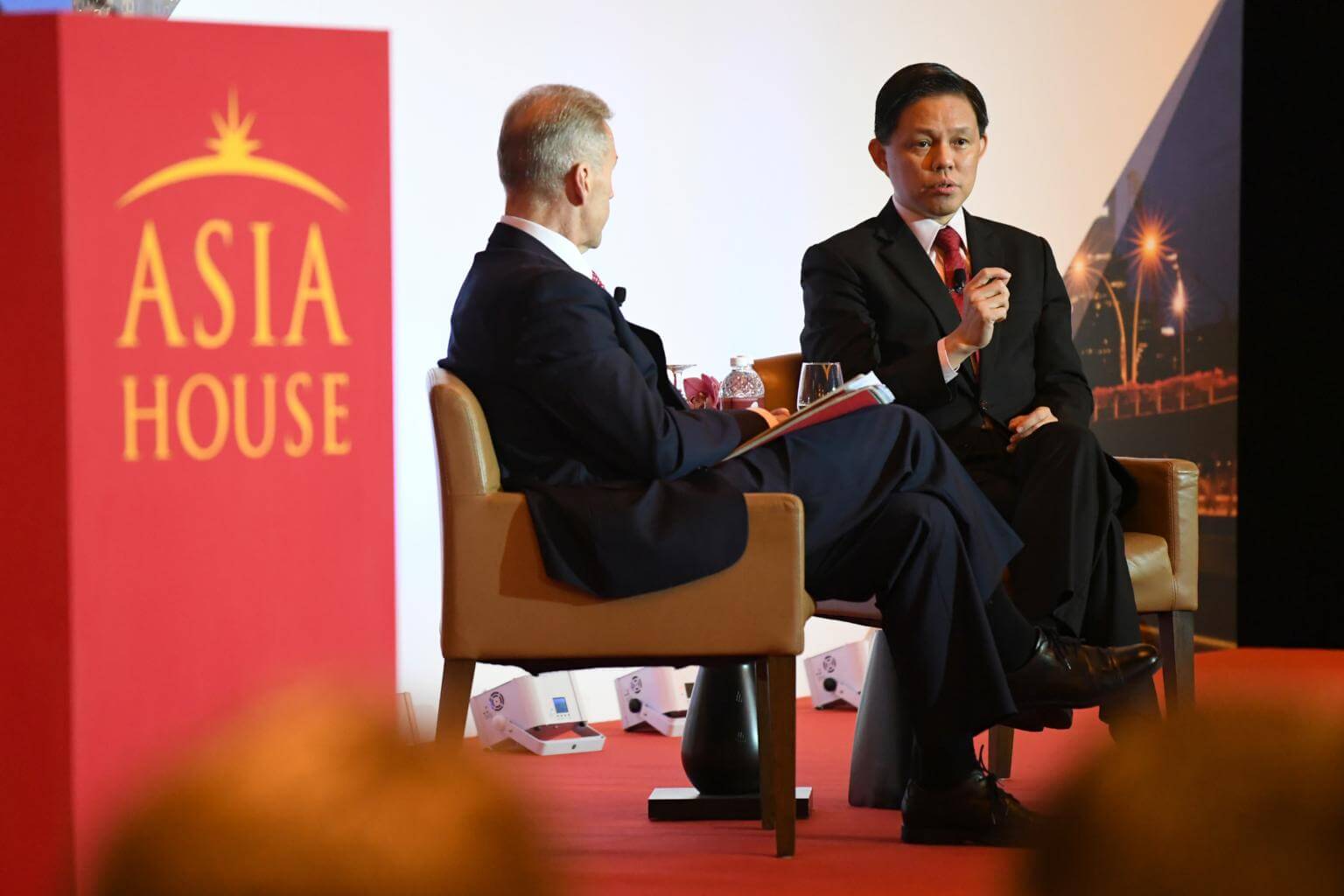Asia Trade in the New Global Order
Asia must create relevance in new global market: Chan Chun Sing
To do so, countries in region should do more to integrate economies, not look for spoils of war, says minister
Sign up now: Get ST's newsletters delivered to your inbox

Trade and Industry Minister Chan Chun Sing with Asia House chief executive Michael Lawrence at the Asia Trade in the New Global Order conference, on Nov 22, 2018.
ST PHOTO: DESMOND FOO
Countries in Asia cannot be looking for the spoils of war and should redouble efforts to integrate their economies, Trade and Industry Minister Chan Chun Sing said yesterday.
Citing Asia's relevance in a new, emerging global market as one of the key challenges that countries need to confront, he said in a keynote address at a regional conference: "Asia will need to strengthen (its) efforts to create relevance... regardless of what is happening between the United States and China."
Appearing to refer to reports that suggest South-east Asia could gain from US-China trade tensions, with potential changes to the global supply chain bringing more business to the region, Mr Chan said Asia cannot be "looking for the spoils of war".
Instead, it has to create relevance by bringing its economies closer together and leveraging one another's relative comparative advantage.
Mr Chan was speaking at Asia Trade in the New Global Order, a conference that includes three panel discussions on the shifting trade landscape, creating a digital ecosystem, and the politics of China's Belt and Road Initiative.
The one-day event at the Mandarin Oriental hotel was organised by Asia House, a London-based centre of expertise on the region.
The panellists included World Trade Organisation (WTO) chief economist Robert Koopman, Vietnam's director-general of mul-tilateral trade policy development Luong Huong Thai and Singapore's Economic Development Board assistant managing director Kiren Kumar.
In his speech, Mr Chan delved into issues affecting the world's future.

Although some countries in Asia may feel compelled to pick sides in the global order, no one wants to see the world being "Balkanised" into different trading blocs, he said.
Mr Chan was using a geopolitical term that refers to the division of the Balkan peninsula in Europe into smaller regions or states that were often hostile towards one another.
Stressing the importance of agreements such as the Comprehensive and Progressive Agreement for Trans-Pacific Partnership, he added: "All these efforts speak to the same urgent need for us to integrate our economies rather than to choose sides or to fragment our regional and global production and value chains."
One area in which greater integration for global economies can take place is the growing digital economy, he said, noting that Asia and partners in Europe, America and elsewhere must come together to help the WTO evolve its system.
Beyond taking care of the conventional goods and services sector, they should look at what new rules are required to enable the digital economy to flourish and integrate, Mr Chan added.
He outlined two other challenges: How the US and China relate to each other, and the way in which the European Union and Britain will decide on their priorities, with or without Brexit.
The US-China relationship determines the global geopolitical backdrop against which trade takes place, he said, adding that tensions now are but a symptom reflecting more fundamental contradictions in their economies and societies.
"Unless and until we manage some of those underlying contradictions, it will be hard for both the US and China to come to a quick resolution," he noted later.
On Europe, he said that while a lot of attention has been put on Britain's exit from the EU, a more important question is what role the EU and Britain wish to play on the global stage, and if it is one of integration or isolation.
He said the EU has a chance to exercise leadership even in Asia, and expressed hope that the EU-Singapore free trade agreement (FTA) will be approved.
"These FTAs, IPAs (investment protection agreements) are not just about lowering barriers to trade but... about the EU's statement to the rest of the world on how it wants to integrate and connect," he added.
In a question-and-answer session with Asia House chief executive Michael Lawrence at the event, which The Straits Times is a media partner of, Mr Chan said the biggest global risks include uncertainty which may cause businesses to hold off investments.
"The global megatrend is towards greater integration, but... we all have to manage the domestic challenges that come (with it)," he said.
This is because it requires businesses to evolve and workers to be retrained, he added, and countries need both political will and capacity to make internal adjustments.


